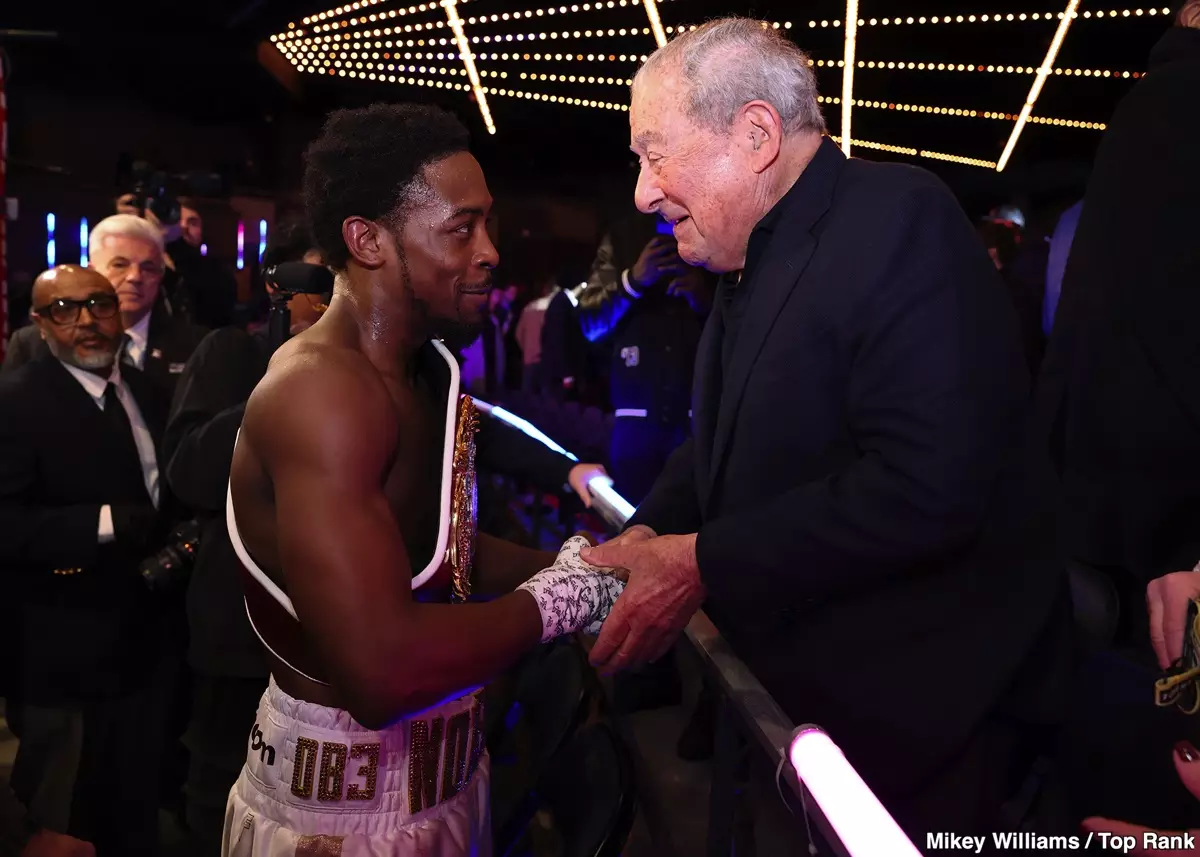Keyshawn Davis recently marked a significant milestone by winning his first world title, defeating WBO lightweight champion Denys Berinchyk via a fourth-round knockout in Madison Square Garden. Despite the euphoric atmosphere surrounding his victory, a deeper examination of Davis’s approach to the sport reveals a pattern of cautious matchmaking that raises questions about his ambition and future in boxing.
Davis, a celebrated Olympic silver medalist from 2020, has exhibited a conflicting narrative that is both inspiring and troubling. While he possesses the skill set, charisma, and athleticism that many observers adore, there is also a glaring absence of willingness to engage in high-stakes matches. Throughout his nascent professional career, he has avoided fights that could double as tests of skill and resolve. Notably, he has turned down chances to face formidable opponents like Andy Cruz, which not only suggests a lack of drive but also raises concerns about his commitment to truly challenging himself.
In striking contrast, legendary boxers such as Sugar Ray Leonard and Tommy Hearns were known for their audacious choices, embarking on high-profile matchups that defined era-defining rivalries. At 25, Leonard had already faced a constellation of boxing luminaries, including Roberto Duran and Wilfredo Benitez. By opting for less challenging bouts, Davis risks being pigeonholed as a fighter concerned more with maintaining an undefeated record than building a meaningful legacy in the sport.
Keyshawn Davis’s trajectory seems hauntingly similar to that of Adrien Broner, who, despite undeniable talent, became synonymous with a strategy of hand-picking less challenging opponents and engaging in publicity stunts aimed at generating interest. This can be a double-edged sword; while Broner’s outward personality and controversial behavior made him a marketable figure, they also led to an eventual decline as his fighting spirit waned in the face of increasingly challenging opponents.
That Davis has been selectively matched by Top Rank, his promotional team, plays into this narrative of a fighter maneuvering carefully around significant risks. Not only is he succeeding in garnering titles through fights against perceived weaker opponents, but in doing so, he curtails the opportunity for personal growth that often comes with facing adversity in the ring. Critics argue that while Davis’s recent win showcases his capabilities, it does little to instill confidence regarding his readiness to navigate the upper echelons of boxing.
Amid the hype surrounding Davis’s victory, there are factions within the boxing community that remain skeptical of his potential as the next “Face of Boxing.” Commentary from boxing analysts and experts indicates that he is jeopardizing future accolades by choosing comfort over challenge. Peter McCormack, for instance, commented on the superficiality of winning “easy belts,” suggesting that this appears more like a marketing strategy than a genuine pursuit of a legacy.
Indeed, his claims of wanting to be a significant player in boxing are at odds with the apparent reluctance to take on dangerous contenders. Gervonta Davis and Vasily Lomachenko, two titans in the lightweight class, likely won’t want to further Davis’s ambitions for the sake of becoming stepping stones. Furthermore, as Davis continues to outgrow the lightweight division, potential matchups may dwindle, limiting opportunities for lucrative or pivotal fights.
Keyshawn’s branding as “The Businessman” succinctly encapsulates his approach to boxing, prioritizing financial gain over the potential legacy that might come from taking on formidable adversaries. By openly admitting his primary drive is financial success, he aligns himself within a category of fighters whose focus remains peripheral to the traditional ideals of boxing glory. This alignment invites skepticism—can he win the hearts of fans while consciously choosing easier roads?
As his 26th birthday approaches, the intrigue surrounding Davis only intensifies. His performances in the ring reveal a supremely talented boxer, yet there seems to be a hesitance to test and expand those abilities against either tough competitors or through varying weight classes. The risk-taking that characterized the early careers of greats has seemingly eluded him, raising the question of whether Keyshawn Davis’s future aligns more closely with financial prowess or the lauded legacy that he, too, can achieve.
While Keyshawn Davis possesses all the hallmarks of a successful boxer, his equally evident aversion to risk could stifle his aspirations in a sport that ultimately rewards those willing to face the chatter of both fans and fighting icons alike. The emerging question remains: Will he choose the path of least resistance or embrace the uncertain road filled with challenges worthy of his notable talent? As his career progresses, only time will reveal whether he can pivot from being a crafty businessman into a true contender with a lasting legacy in the annals of boxing history.


Leave a Reply